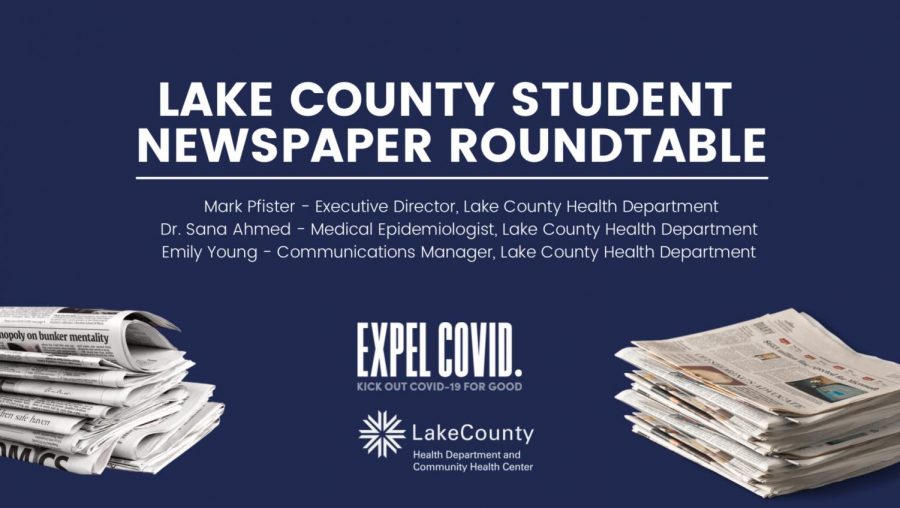LCHD updates student journalists about vaccination
Photo by Sasha Kek
Mark Pfister, Lake County Health Department executive director, talked to students about the development and effectiveness of the COVID vaccine. “The technology and being able to look at the genomic sequence made it much more beneficial to put this vaccine together in a timely manner, but billions of dollars were allocated for additional research and development, and I think that’s what a lot of us forget about; pharmaceutical companies, when they do research and development, they want to invest in something that is going to be a return on their investment. Usually, the flu vaccines tend not to be a large return on their investment, so in this case, they’re getting a large return on investment and put in the research that was necessary to get these very highly effective vaccines that are 90 plus percent effective,” Pfister said. “The flu vaccines tend to be about 40 to 60% effective, so great, great work that they did to get these very effective vaccines.”
The Lake Country Health Department (LCHD) hosted a roundtable for student journalists on November 15 to give updates on the vaccine and vaccination in Lake County.
The LCHD Coronavirus Data Hub records a total of 77,457 confirmed COVID cases, which accounts for about 4.3% of the total cases in Illinois, and a 98.5% recovery rate as of November 29.
LZHS currently has three active COVID cases as of November 19, while the district had 133 student and 19 staff cases in total, according to the Health and Wellness dashboard.
Mark Pfister, LCHD executive director, and Sana Ahmed, LCHD medical epidemiologist, sat on Zoom with student publications to answer questions regarding vaccination rates and general information regarding the vaccine.
Q: What is in the COVID vaccine?
A: “In the vaccine, you’ve got a packaged protein called a spike protein. [If] you’ve seen some pictures of a virus with little spikes coming out of it, that spike is what’s actually packaged in the vaccine, so it’s not the virus,” Ahmed said. “When the vaccine is put into a person’s body, that gets introduced to the body and that’s like protein in its package enters the cell. It uses not the cell’s nucleus where the DNA is stored, but it uses the factory; a spike protein is the recipe and it goes into the kitchen, or the factory that’s in your cell, and it produces more of [the spike proteins] and spits it out. The rest of the vaccine disintegrates, and then the body is able to recognize the antibodies to the spike protein and build that immune response.”
Q: Why should individuals get vaccinated?
A: “It’s really important to know that the virus doesn’t discriminate. It affects everyone from infants to babies, to elderly folks that are in their 90s to 100s, and it interacts with bodies differently across the age spans,” Ahmed said. “We know that the most vulnerable are the very young and the very old, but at the same time, people of different age groups can also have severe disease, they can be hospitalized, and unfortunately they can also pass away and die from it. More importantly, for those that are very young or who are elderly, we have a responsibility to help protect those individuals as well, and the way to do that is by getting vaccinated. We don’t know who our best friend or a coworker, or someone that we know that we met at a party, what their home situation is like or what their career is like; if they were to get infected, they may infect a person who’s vulnerable and that vulnerable person may die from the disease, so it’s really important and a responsibility in the community that we all get vaccinated to protect each other.”
Q: Do individuals who contracted COVID need to get the vaccine?
A: “Antibodies, which is what your body builds after being infected with COVID-19, [are something] we’re still gathering a lot of data about,” Ahmed said. “We don’t know what level of antibodies will protect you from getting symptoms, what level of antibodies will protect you from hospitalization, what level of antibodies will protect you from having long term symptoms of COVID; I think those are parts of research that we’re still trying to understand, and even getting infected with COVID-19, we just don’t have a great sense of how an individual’s body will protect them and for how long. It’s really important just to get vaccinated because we know with the vaccine and the way that it works, it will target the appropriate immune response and it will build protection.”
Q: Can getting the COVID vaccine give an individual a COVID infection?
A: “The vaccine will not cause you to have a COVID infection, however, we have had instances where people have been exposed to an infected person unknowingly, then got vaccinated in that 14 day time frame, developed symptoms that were not just vaccine related, then tested positive,” Ahmed said. “If you were to test positive soon after getting vaccinated, it’s not because of the vaccine, but because of some sort of exposure that you’ve had in the past 14 days to an infected person, either knowingly or unknowingly. It’s really, really important that if you’re unvaccinated or partially vaccinated, make sure that you’re practicing masking and social distancing, then once you are considered fully vaccinated, you still want to practice masking of social distancing, at home and with loved ones that are fully vaccinated, you wouldn’t necessarily have to do that because you are protected at that point.”
Q: With booster shots available, will the definition of “fully vaccinated” change?
A: “Booster shots are currently recommended for individuals 18 years old and up, so if more data is presented as children get vaccinated, those recommendations may change over time,” Ahmed said. “At this time, the definition of fully vaccinated has not changed because of boosters; a person is considered fully vaccinated if they received the first two doses of either the Pfizer or Moderna vaccine, or first dose of the Johnson & Johnson vaccine. As more data is gathered and viewed by the experts, if there are changes in any of those recommendations.”
Q: Why is the COVID vaccine not mandated in schools?
A: “The reason why they’re not mandated in schools yet is because the vaccines are [not] authorized or approved,” Pfister said. “Right now, the Pfizer vaccine is the only licensed and approved vaccine, and that’s for the age groups that are not in schools. Moderna currently is not authorized for [the 5to 11 and 12 to 18] age groups, nor is Johnson and Johnson, so that’s why the only COVID vaccine for younger groups is Pfizer, but it’s not quite licensed yet. We do expect it, but more time has to go on so that they can bring it back for the FDA to approve it or license. We are recommending that everybody get vaccinated as soon as possible. The sooner we get vaccinated, the sooner we get our lives.”
Q: How does Lake County compare to Illinois, in terms of vaccination?
A: “Compared to the rest of the state of Illinois, Lake County is the third most vaccinated county in the state for the total population, however, we look at the eligible population, which was greater than or equal to 12, and we’re number two in the state,” Pfister said. “Obviously, we’re doing really well this last week because we were third for the most vaccinated for five to 11 year olds, and that vaccine has only been authorized for a short time. I think the biggest thing that I’m most proud of is that if you look at the number of deaths per 100,000 people; Lake County is actually the top county for the lowest number of deaths, so we’ve doing extremely well there. When we compare it to other counties that are less vaccinated, they’ve had many more deaths per 100,000 of their population, so overall Lake County has done very well.”
Q: How many breakthrough cases are in Illinois, and what is the reason for these cases?
A: No vaccine is 100% effective. Think about it this way: if we started out with all blue cars in Lake County – no vaccine is having all blue cars – now 80% of our cars in Lake County are red because they’ve been vaccinated, so the more cars that are red or the more cars that are blue, the greater the potential that that blue car or that red car is going to be an accident,” Pfister said. “We are still seeing that the unvaccinated make up the vast majority of new cases compared to those that are vaccinated, and the people that are vaccinated are not being hospitalized or dying, so that’s the reason why these vaccinations are so effective; what we’re really looking at now is the number of people that are hospitalized or dying that are vaccinated, and that’s the important point. If you look at five to ten year olds that haven’t been able to be vaccinated, that’s where most of our new cases are. The point is no vaccine is 100% effective. The more people that you have vaccinated, the greater the potential you’re going to have breakthrough cases.
Q: When does the LCHD anticipate that mask guidelines will be diminished?
A: “This is definitely something that the governor is thinking about and the Illinois Department of Public Health, and what they’re doing right now is trying to determine what metrics we’re going to be utilizing to make that determination as to when masks may not be required in a public setting, however, I don’t know right now that there’s been any discussions yet to remove masking in the school situation,” Pfister said. “The problem with cases is that when you’re testing more, you’re going to find more cases. I think they’re looking at some other metrics, like hospitalization, to make that decision, but right now, especially since we’re still in high community transmission, there has been no indication that the governor is going to remove the executive order for masking in public places.”

This is Sasha’s third and final year working with the Bear Facts staff as the LZ Life Editor. Aside from helping Bear Facts run smoothly, you can find...

